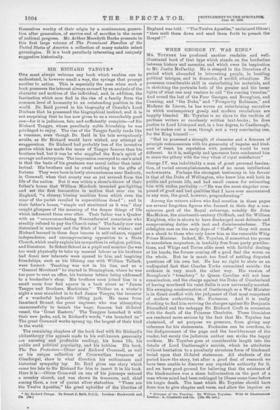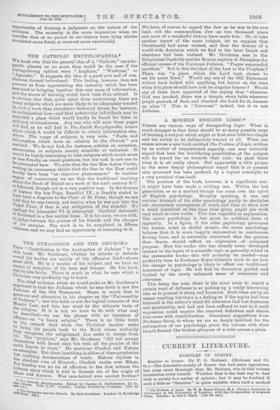WHEN GEORGE IV. WAS KING.*
Ma. TOYNBEE has produced another readable and well- illustrated book of that type which stands on the borderline between history and memoirs, and which owes its inspiration to Mr. Justin McCarthy. He is steeped in the literature of a period which abounded in interesting people, in bustling political intrigue, and in dramatic, if sordid, situations. He possesses considerable skill in assimilating his materials, and in sketching the portraits both of the greater and the lesser lights of what one may venture to call " the roaring twenties." And round the last of the Four Georges, and Brougham, and Canning, and "the Duke," and "Prosperity Robinson," and Madame de Lieven, he has woven an entertaining narrative in which contemporary gossip and modern revelations are happily blended. Mr. Toynbee is no slave to the verdicts of partisan writers or carelessly written text-books ; he does justice to Lord Liverpool and, in a less degree, to Castlereagh, and he makes out a case, though not a very convincing one, for the King himself :— "Had he possessed a strength of character and a firmness of principle codsmensurate with his generosity of impulse and kind- ness of heart, his reputation with posterity would be very different. As it is, malignity and ignorance have condemned him to share the pillory with the very vilest of royal malefactors."
George IV. was indubitably a man of great personal fascina- tion, of varied aecomplishments, and of no mean intellectual endowments. Perhaps the strongest testimony in his favour is that of the Duke of Wellington, who knew him well both in public and private life, and had small reason for estimating him with undue partiality :—" He was the most singular com- pound of good and bad qualities that I have ever encountered in any man, the good, however, preponderating."
Among the minors sidcra who find mention in these pages are several forgotten figures who formed in their day a con- spicuous part of the Royal entourage, notably Sir John MacMahon, the nineteenth-century Chiffinch, and Sir William Knighton, who is shown to have discharged most delicate and compromising duties with tact and disinterestedness. The sidelights cast on the early days of " Gaffer" Grey will come as a shock to those who only know him as the venerable Whig Prime Minister. Indeed, Mr. Toynbee, if somewhat too prone to scandalum magnate/a, is laudably free from party predilec- tions, and Whigs and Tories alike meet with faithful dealing at his hands, the former coming off a good deal the worse on the whole. But he is much too fond of settling disputed questions off his own bat. He has no right to state as an undisputed fact that Charles Yorke committed suicide : the evidence is very much the other way. His version of Brougham's "treachery" to Queen Caroline will not bear examination, and the charge against the Duke of Cumberland of having murdered his valet Sellis is now universally scouted. His sweeping condemnation of Castlereagh as a War Minister is in direct conflict with the judgment of that most competent of modern authorities, Mr. Fortescue. And it is really shocking to find him reviving the charges against Sir Benjamin Bloomfield and the unhappy Sir Richard Croft in connexion with the death of the Princess Charlotte. These blemishes are rendered more serious by the fact that Mr. Toynbee has abstained, of set purpose we presume, from giving any reference for his statements. Footnotes can be overdone, to the disfigurement of the page and the bewilderment of the reader, but surely the judicious author can strike the happy medium. Mr. Toynbee goes at considerable length into the details of Lord Castlereagh's suicide, which he attributes without hesitation to a peculiarly atrocious form of blackmail levied upon that ill-fated statesman. All students of the period know the story, but after a good deal of research we have been unable to discover any reputable authority for it, and we have good ground for believing that the existence of the blackmailers was a sheer hallucination on the part of a man whose mind had been unhinged by illness some time before his tragic death. The least which Mr. Toynbee should have done was to give chapter and verse, and allow the inquirer an
" Glimpses of the Twektias. By William Toynbee. With 24 Illustrations London A. Constable and Co. [18s. ed. meta oPportunity. of forming a judgment on the nature of the evidence. The necessity is the more imperative when we consider that at no period in our history were lying stories circulated more freely or received more uncritically.



























































 Previous page
Previous page